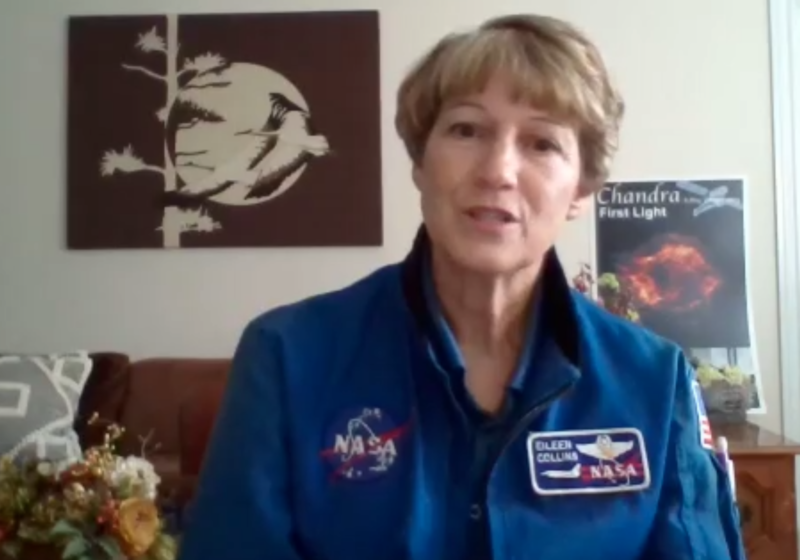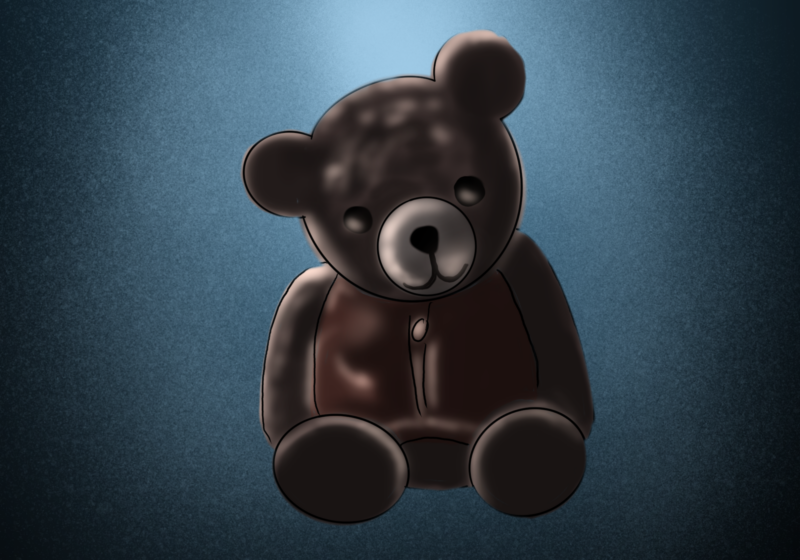Higher, further, and faster was the phrase that Colonel Eileen Collins drove back to during her talk on Saturday night. Collins’ motto for her career was to go higher, further, and faster — a mindset that should be carried towards the future of space innovation.
Collins delivered a virtual talk on Sept. 12 to the UR community about her career at NASA and the future of outer space. She was originally supposed to be the Student Programming Board’s spring speaker but due to COVID-19, the talk was moved to this fall.
Collins’ extensive career in the United States Airforce and at NASA was defined by a number of firsts. She was the first female to pilot and command a space shuttle flight for NASA. She was a member of the first-ever class of women for the United States Airforce test pilot program. Her career was driven by her passion for space. Collins wanted to be an astronaut, a goal that guided her trailblazing career.
Collins divided her talk into three sections: her path to NASA, her experience in space, and the future of space exploration. The thread between these topics was her passion for spaceflight. Collins wants to go higher, further, and faster, a homing beacon that grounded her discussion.
Her passion for flying began at a young age. She grew up during the space race and at the Elmira, NY airfield — two sources of inspiration for her future flying career. Collins wanted to be up in the air, and that aspiration led her to save up her money to take flying lessons in her teenage years.
The stars aligned in her later college years at Syracuse, where Collins signed up to be one of the first-ever women to participate in an experimental test pilot program for the United States Air Force. The Air Force was the gateway to her career at NASA. Collins stayed disciplined and focused on her mission; she was headed to the stars.
Collins dove into her experience in outer space, specifically her last mission before she retired. She narrated a movie of her last mission, from liftoff to the welcome ceremony they had on the International Space Station, switching out a broken gyroscope on a spacewalk, and the eventual departure and trip back down to Earth.
Collins honed in on the view, and confirmed that the Earth, in fact, is round. As a pilot, she always saw the earth as a flat checkerboard miles beneath her, but the first time she went up to space, she saw the Earth from a new angle. A part of that new angle was that the Earth is strikingly round, a different perception than what we have down on the ground. Her first sunrise in space looked like a rainbow, and once she took it in, she went back to work.
Collins shared insight into what it was like to return back to Earth, a problem that researchers are trying to improve. Collins described standing up as “trying to get out of a rowboat with 50 pounds on your shoulder.”
The final point of her talk was to describe the future of space. While the space shuttle that she flew on has been retired since 2011, there have been many breakthroughs since then. The U.S. and Russia held a partnership since 2011 where Russia would send astronauts up to the International Space Station. Space X had a successful mission where they launched their shuttle back to the International Space Station. Boeing’s shuttle will launch in the near future.
The next step for space exploration? Going back to the moon. Collins described the steps that will be taken to return to the moon for a long term stay. The mission outlined for the moon will be the foundation for the longer trip to Mars.
Advancements are being made not only in space travel, but in renewable energy as well. The International Space Station runs completely on solar power, with the future goals being 100% recyclable air and water — two goals that will also help the mission to Mars.
Collins at the end of her talk asks the audience: What will the next revolutionary technology be? She lists off innovations such as the printing press, telephones,automobiles, and airplanes. Collins believes that next on that list is advancements in propulsion technology. What will this advancement allow the human race to do? Collins followed through with the phrase of the evening — going higher, further, and faster to the future.
—
The Campus Times was able to talk to Eileen Collins before her talk Saturday night. The interview has been edited for length and clarity.
What do you hope for UR students to take away from your talk?
First of all, knowledge of what is happening in outer space right now. I would like the students to understand what is the environment of space, who are the players, what are the countries operating space, what are the astronauts like, so in general, the first thing would be knowledge of space today.
I would also like them to understand what has happened throughout the history of space, what it feels like to be in space, and what is the future of space? So that’s it in a nutshell.
How do you think college students should develop their leadership skills?
There’s really three basic elements of leadership. One is knowledge, one is communicating, and one is integrity. And they’re all important. There’s so much more that you could throw in, you know, passion for what you are doing, there are so many other things that you could throw in but those three are basic elements. And that’s what the military has always taught us.
Knowledge: For students who are preparing to be future leaders, you’ve got to have knowledge of the industry that you are going into. You’ve to go to understand, not everything — you cannot possibly understand everything — but you have to understand how that industry works, or what is the mission of the organization you are leading. You have to understand that.
Secondly, how to communicate. The things that you can do in college to work on that, frankly to join clubs, join sports, there are so many opportunities in college. The universities really go overboard in giving students opportunities, so do some of those and do the ones you like. You don’t have to do the ones your friends are doing, or that you think someone else wants you to do. Do what you want to do. Do something a little bit different. So that way you learn to work with people and many of those organizations will give you leadership experience.
And also may I add to that, […] when I was in college I worked in a pizza joint, I worked in a catalog showroom, I didn’t have any glamorous jobs in college. Anything that you do, internships, anything like that will help.
The third one is integrity. There are many ways you can work on integrity. I kind of think of integrity as being an honest person. But also, you want other people to expect you to be honest with them in the future — that’s integrity. So, what some of the things you can do is read books about great leaders, and why some of these great leaders did succeed. Usually, they succeeded and they were an admired person because of their integrity.
What advice do you have for students who want to go into the aerospace/space industry?
For students that want to go into the aerospace/space industry right now, people think engineering. But […] the space industry needs lawyers, medical people, researchers, teachers, you name it. Almost every job can matrix over into the space industry, so I would say to get informed about what is going on in space. There are organizations like the AIAA, The American Institute of Astronautics and Aeronautics, that is the professional organization for people that work in the aero and space.
What is the most important thing a student in the STEM field needs to learn? Similarly, what is the most important thing a student needs to learn during their time at college?
The first thing that comes to mind is problem-solving. I think that’s important because when you are out in the workforce, and you jump into your first job, you’re going to see that there are problems everywhere. And every time there’s a solution, there is a new problem.
When some people are faced with a problem they back off. They are going to either go online and play a game instead, avoid the problem, or they are going to have a beer and forget about it. Some people avoid problems, and it’s sad because they haven’t been taught how to face problems and solve problems.
I try to tell myself mentally when faced with a problem, that my human reaction to a problem is to go away, I don’t want to deal with it. That’s my first reaction. But then I’ve got to remind myself, problem-solving is a challenge. Try to make it fun, try to make it a challenge. Because working through problems is difficult, but then when you solve it, it’s a wonderful feeling. Life is just going to be a series of solving problems.
There is an ongoing discussion about spending money on space exploration while there are problems that we haven’t solved on Earth, where that money could be used. What are your thoughts on this conversation?
The whole purpose of the space program is to solve problems on Earth. But, to solve the problems on Earth, we need to look at it from a different angle. What is the big problem on Earth right now? Well, you have a pandemic, you have this virus. So, let’s think about the International Space Station.
The International Space Station does all kinds of work, it’s an international laboratory, and they are actually doing research on vaccines right now. They also do research on cell growth, plant growth, microorganisms, but we have worked on several different vaccines on the International Space Station.
The other thing is countries getting along. Another problem on Earth is countries getting along with each other: We don’t want wars, we don’t want countries fighting each other, we definitely want peace. The International Space Station is Russia, the United States, Japan, European countries, you’ve got Canada, Brazil, coming together and working in space. It’s like this great big United Nations program in space.
There are so many different things that are happening in space, that are really helping us on planet Earth, and Earth is getting crowded. The population is going up and up. Some day people will need to leave Earth and go to other places. People will populate the solar system, and people will populate the galaxy. I think that will happen someday.





